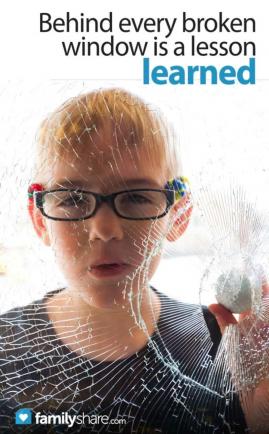
As adults, you are accountable for everything you do. Most likely it was your parents or a guardian who taught you that choices have consequences - good and bad. Now, it's time to teach your kids. Even though they may push the limits, they need to be taught the same principles. Ensuring they have a solid grasp of accountability will help when they face tough choices.
Here are some tips to help teach them about accountability.
Start with the basics
Children's brains are developing. Because they haven't yet had real-world experiences, their definition of right and wrong may not be fully developed. Having a short lesson on right and wrong and the consequences - either forced or natural - is a good start. Sometimes, role-playing can help internalize the lesson better. Creating a scenario where kids can act out a situation can help them feel safe and yet teach them a valuable lesson.
Start when they're young
Little kids can learn accountability. Teach your kids that when they're responsible for something, it means they are accountable for it. If she has a favorite doll, it's her responsibility to ensure the doll is taken care of; not left on the floor where the dog can use it as a rag doll to throw around. Let her know that if she doesn't take care of it, there are consequences. If she fights with her little brother and pushes him down, she is responsible for her actions. If she knows there will be a consequence, she will learn not to do it again.
Give them consequences
Again, let him know that if he doesn't take care for his new fish, it will die. That may seem harsh, but it's a natural consequence. Teaching him that lesson before he gets the fish will help him put it into action. If you set the ground rules about owning a pet, he will take it seriously.
Set clear expectations
If the rule in your home includes not saying, "Shut up," set that rule and the consequences attached to it if the rule is broken. If she has a chore that isn't finished by the time she wants to go to the mall, remind her of the consequence. Then, stick to it.
Be consistent
Don't allow exceptions to the rule, unless it's very rare. If you're not consistent, he won't take his responsibility seriously. This can set him up for problems with a future boss, professor at school or a future spouse.
Don't bail them out
You love your kids. It's only natural to want to bail them out when they've made a mistake. However, doing so will only teach them that it's OK not following through with their responsibility because someone will bail them out. If the consequences are serious, it will be painful to watch that happen. However, it's also necessary for their learning and growth.
Set a good example
If he sees you following through with your own responsibilities and being accountable for your words and actions, he will mimic those actions. It's also a good idea to let him see when you've made a mistake then corrected it. That's a perfect time to use "teaching moments." When I've made a mistake, my kids knew about it. Sometimes they laughed and ridiculed me about it, but they saw that Mom wasn't perfect. It was also a time when I used teaching moments to say, "Don't do this."
Teaching kids accountability will help them live a moral life. When they have their own kids, these lessons will have a ripple effect that can last a lifetime.

